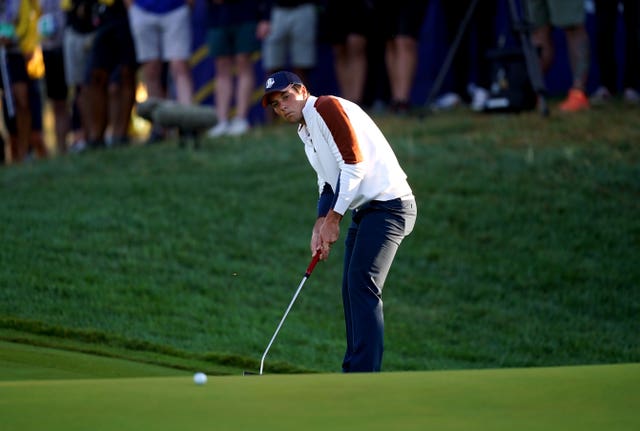Scottie Scheffler and Brooks Koepka add to USA woes with horror start to day two
Europe captain Luke Donald had warned his side to be wary of the US players reacting like “a wounded animal” to Friday’s whitewash.

World number one Scottie Scheffler and five-time major winner Brooks Koepka were guilty of a comedy of errors as the United States suffered a nightmare start to day two of the Ryder Cup.
Europe captain Luke Donald had warned his side to be wary of the US players reacting like “a wounded animal” as they looked to overturn a record-equalling five-point deficit, but the only wounds on show were entirely self-inflicted.
Scheffler and Koepka covered the first three holes of their foursomes match with Viktor Hovland and Ludvig Aberg in five over par to unsurprisingly lose all three, before Aberg almost holed his tee shot on the fourth to extend the lead.

Pars on the first and third, either side of Fleetwood’s birdie on the second, took the European pair three up and although the Americans won the fifth, they conceded the next after struggling to find Spieth’s drive in the rough and being refused relief for an embedded ball.
Donald had unsurprisingly kept faith with the pairings who had secured an unprecedented clean sweep on Friday morning and saw Jon Rahm and Tyrrell Hatton take an early lead against Patrick Cantlay and Xander Schauffele.
Max Homa and Brian Harman briefly had some American red on the board with a birdie on the second, but had been pegged back to all square by Shane Lowry and Sepp Straka.
United States captain Zach Johnson had kept two foursomes pairs together despite the opening whitewash, although his hand had no doubt been forced by an illness spreading through the team.
“There’s been some unforeseen things that we’ve had to navigate around, which is really unfortunate, in the sense of health,” Johnson said.
“It’s not an excuse because we have depth but I’ll just say I’m grateful we have a team doctor. Guys are fighting and playing regardless.
“It’s one of those where sometimes the energy is probably a little low, but the ability and desire to go out and play is still there.”





